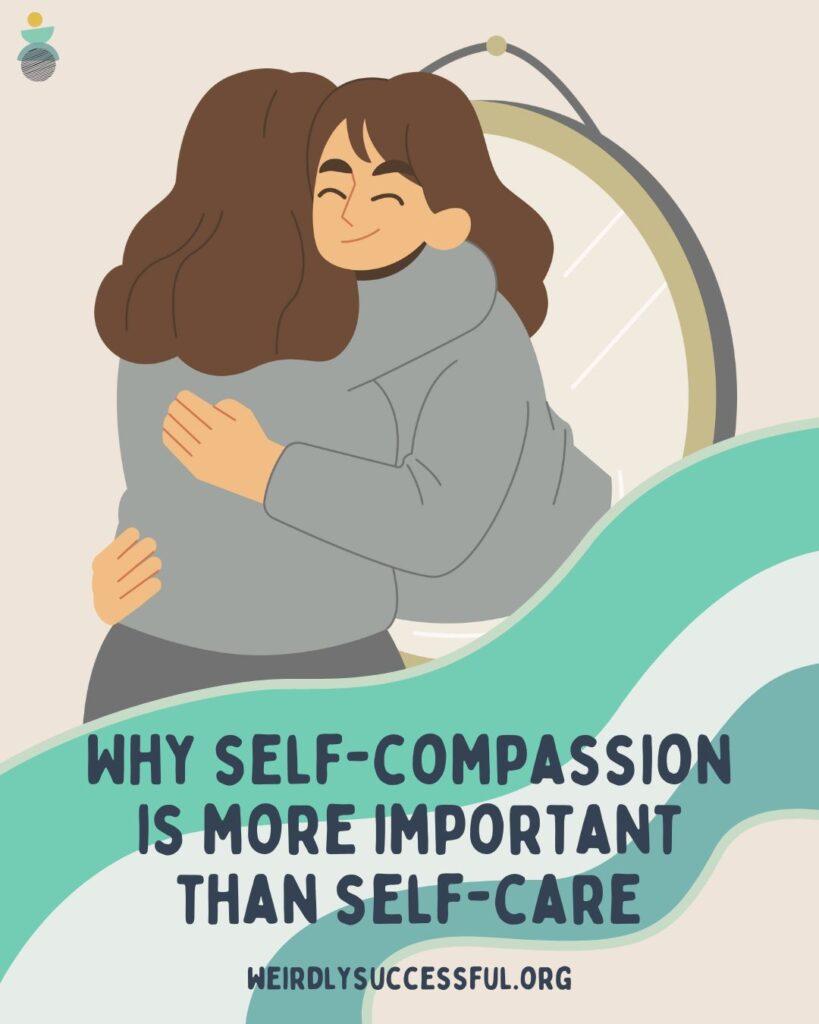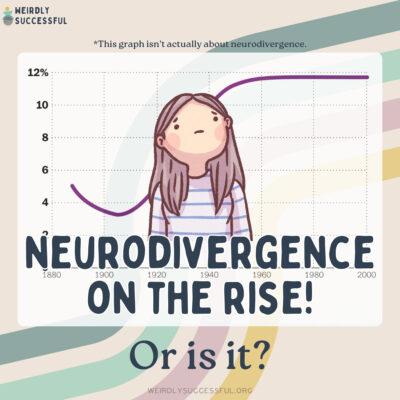Table of Contents[Hide][Show]
What is self-compassion?
Self-compassion is often overlooked in favour of self-care. Both are very important, but one builds on the other. So before any act of self-care, let’s talk about self-compassion first.
Self-compassion literally means what it says on the tin: you have compassion for yourself. You can feel empathy towards yourself, you can be kind, even loving towards yourself.
If these words seem too big and abstract and pompous, let me phrase it differently: self-compassion means you treat yourself as you would treat a person you love.
Why is self-compassion important for neurodivergent people?
You have a lifetime of “you’re not enough” to unlearn
Phrases like “you’re not living up to your potential, “you could do better”, “you’re so gifted; if only you applied yourself more” teach neurodivergent kids early on to ignore their needs and not honour their limits.
In an effort to prove these people wrong, they often push themselves over their limits, harming themselves in the process.
And since neurodivergent kids grow up to be neurodivergent adults, this message stays with us for a long time.
It is not simple to unlearn all this, but if you slowly start to question these beliefs, you can unravel this whole mess.
- What does rest look like when your productivity is not tied to your worth as a human being?
- When and where would you stop if you could truly stop when you’ve had enough instead of when you feel like you’ve done enough?
- What’s the difference between those two lines?
You’re often told you are not doing enough
If you have executive challenges, like difficulty starting a task, or “procrastinating” – in reality, trying to gather the mental energy required to begin a project, it is very hard to stop the momentum, even after you’ve exhausted yourself.
Denying yourself rest because you need to do more, and be more all the time to prove you’re worthy is an Express Ticket to Burnout City.
Having self-compassion can look like allowing yourself to rest, to say no, to have a break way before you’ve reached your limits. It is okay to take a breather even if you theoretically could go on for more hours or sleep less.
Your boundaries being violated is the norm
We’re used to overriding our limits in order to feel more acceptable and worthy.
Many of us with ADHD and/or Autism have trained ourselves to function “as well as normal people” and produce the same working hours — no matter how exhausting or actually productive they might be.
We’ve trained ourselves to ignore our need for rest, our need for breaks, and quiet, and just keep on pushing. For many people, this means they only stop when they hit a wall, instead of stopping way before the wall.
It is harder for most neurodivergent people to filter out information (sensory or otherwise), and this means we need extra time to process everything. But when your needs are not supported, it can become very exhausting very fast.
If you are not the one to define and protect those boundaries, they will be crossed, because no one else will put them there for you.
Self-compassion vs self-care

For many years now, self-care has been the go-to, magazine-level solution offered for everything. From simpler things like being tired at the end of the day, to much more complex issues like burnout, depression or systemic oppression — all you need is some me-time!
Don’t get me wrong. Soaking in a nice warm bath, with or without bubbles, in the dark illuminated only by scented candles, without the harsh whirring of the fan extractor – that’s a great way to unwind, decompress, and reconnect with senses that most people don’t utilise daily.
Working in jobs focused on looking at objects and thinking about things does not often utilise our body, or senses like smelling for that matter.
But that poor bubble bath has been assigned way too much to handle by now.
In fact, the more fundamental the problem, the more ridiculous it seems to look at self-care as a solution rather than a short-term relief and recharge.
Self-compassion means giving yourself a break in the literal sense (taking time off) and also in the metaphorical sense (not treating yourself unfairly).
Where self-care falls short
In this way, self-care is time-limited and effect-limited.
It is a tool that works great when applied to the right level of need.
However, when you need to fix deeper-rooted needs, self-care is the band-aid on a broken bone.
Yes, bubble baths and scented candles are nice. But they will not fix problems that need systemic change in the way you handle work, relationships, mental health, or your relationship with yourself.

5 ways to start practising self-compassion
1. “What would Xena say?”
Work on your inner monologue. It is very easy to say that you just need to love yourself more. I know it’s a very big ask. So let’s not even start there.
Instead, try approaching self-compassion with this question
- Think of a person who you trust and love and know they care about you
- Ask yourself: What would this person say to me now?
If what they would say makes you nervous, or hurt, you can feel yourself getting smaller: choose a different person. You know you found the one when you feel lighter, empowered, and even expanded when you ‘hear’ their words.
This person can be a real one like a cherished friend, relative or favourite teacher. And they can even be fictional! Think of a character from a book or TV show that you’d like to have as a mentor figure or as a friend to rely on. Of course, you can also choose a spiritual being, deity or creature who personifies love and care for you.
2. Build out your Emotional Forecasting System
Notice your needs – and then do something about them.
What are the signs of you getting tired?
- Do you feel more fidgety when you start to lose focus?
- Are you getting hungrier and angrier in the process?
- Are your socks suddenly the most irritating thing in the world EVER?
- Can that stupid pigeon finally shut the eff up????
Try to catch the signs before they turn into something bigger, like a crash or meltdown.
And when you do notice the signs, take a break as soon as possible. Have a breather, eat something, or do whatever in your power that helps you at that moment.
3. Use scripts to set boundaries
Saying no and honouring your limits can be one of the most liberating things to do for your mental health. But it’s also impossibly scary. When you’re already not at your best, drawing the line in the sand can be intimidating. Here’s where scripts come in handy!
It is not silly to have scripts ready for times when you need a little encouragement.
- Write up a couple of sentences for situations when you need to turn down a project or offer. And then – this is important – do give them a test run at home!
- You don’t have to do it in front of a mirror, just make sure the first time you actually say “I am very sorry, but I’m afraid this won’t be possible” is not when you need it the most.
- It can also be helpful to have a power-up song to pump yourself up at home and practice your script while dancing.
Catch me next time rocking out to Lizzo while screaming “Thank you for thinking of me, but I don’t think I’m the best fit for the project.”
4. Create a safe space for yourself to feel what you need to feel
Constantly ‘behaving’ and masking how you really feel can be exhausting. It’s also making it harder for you to notice your actual needs, wants and limits.
Make sure to have a time and place where you don’t have to pretend. Just feel what you need to feel and regulate however you see fit.
Whether it’s journaling without restraints, running while music blasts in your ears, going on a rollercoaster to scream your lungs out, having a living room disco session and dancing around aimlessly, find the thing that lets you be you. Without expectations and judgement – just stim to your heart’s content.
While you do this, you can also practice using your caring voice and allowing yourself to be the weird and wonderful little person you are. It is okay to be cringe. ♥
5. Delete ‘should’ from your vocabulary – at least from time to time
Finding out what you really want and need and then giving it to yourself is what I think self-love and self-compassion really are about.
But it is hard when the world is full of expectations and shoulds on how you should look like, what should you achieve, or what you shouldn’t do. From time to time, honour the wishes you have.
Look for sentences that start with “If I had a choice…” or “If it were up to me…”, and, if possible, choose the thing. It can feel very liberating and almost exhilarating to choose the seemingly inappropriate option.
You don’t have to think of huge choices, just tiny ones that would make you feel giddy.
Once I had breakfast at a nice cafe, stayed there for a working session, and then decided to have lunch there as well. It felt the most naughtily luxurious thing to do.
And I still remember the summer afternoon when instead of carefully planning out an outing and buying tickets well in advance, we just went by the cinema, and on a whim, decided to watch the latest Spider-man installation there and then. I don’t remember a thing from the movie, but I still remember how elated I felt at the possibility of wanting to do something and then doing it instantly.
The good news: it all adds up
As you can see, the road to self-compassion might be a long one, but it’s paved with tiny acts of kindness towards yourself.
I’d love to hear from you in the comments!
How were you nice to yourself recently? Will you try any of the tips above? Which one calls you the most?






 How to spot if a product for ADHD is a rip-off: look out for these 10 red flags
How to spot if a product for ADHD is a rip-off: look out for these 10 red flags
Leave a Reply